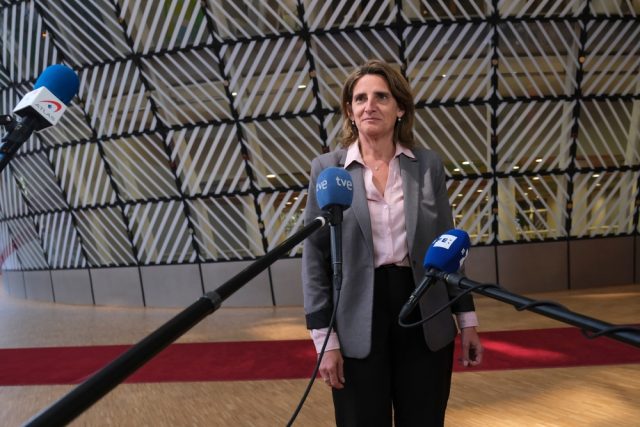
The formation of the new European Commission has evolved into a politically charged contest, threatening to delay the planned start of the EU executive on 1 December, as envisioned by Ursula von der Leyen. The stalemate arises from tense negotiations between the European People’s Party (EPP) and the Socialists & Democrats (S&D), which have resulted in a deadlock over high-level appointments within the Commission.
A key source of contention has been the EPP’s initial veto of Spanish Minister Teresa Ribera. Nominated to take on a pivotal vice-presidential role, Ribera was earmarked to oversee the Competence portfolio, which includes responsibility for green policies and competition. This position is critical as Europe advances its ambitious energy transition in the face of mounting geopolitical challenges and the urgent need for climate action.
Despite initial resistance, the EPP has recently offered its backing to Ribera, even as the Spanish Popular Party (PP), led by Alberto Núñez Feijóo, voiced its objections. Ribera is now set to assume the role of Vice President for a Just, Clean, and Competitive Transition, where she will steer green policy and oversee competition matters. Her confirmation highlights the complexity of European politics, where alliances often transcend traditional ideological boundaries.
The Spanish government moved swiftly to prepare for Ribera’s transition to Brussels, ensuring her domestic responsibilities were wrapped up before her departure. On 24 September, the Council of Ministers approved several initiatives Ribera had prioritised, including updates to the National Integrated Energy and Climate Plan (PNIEC) and the reinstatement of the National Energy Commission. These measures underscore Spain’s commitment to its climate objectives, even amidst leadership transitions.
To fill Ribera’s role, the government has appointed Sara Aagesen as the new Minister for Ecological Transition and the Demographic Challenge. Aagesen, a 48-year-old engineer who previously served as Secretary of State for Energy, is expected to maintain continuity in the government’s environmental policies. However, her appointment has prompted concerns within the energy sector, particularly regarding Joan Groizard, a controversial figure in energy policy.
Groizard, currently Director General of the Institute for Energy Diversification and Savings (IDAE), is tipped to succeed Aagesen as Secretary of State for Energy. Known for his strong advocacy of renewable energy, Groizard has also been a vocal critic of nuclear power—a stance that has drawn significant criticism from industry leaders.
The controversy surrounding Groizard stems from the essential role nuclear energy plays in Spain’s energy mix. Nuclear power is a critical source of stable and reliable energy, contributing to supply security, price stability, and energy sovereignty. It also supports key sectors such as industry, research, and medicine. Critics argue that neglecting nuclear energy risks undermining Spain’s long-term energy strategy, particularly as the European Union has already recognised nuclear power as green under specific conditions.
Groizard’s influence over European funds allocated for the energy transition has also raised alarms. Restrictive policies on nuclear energy could hinder Spain’s ability to meet its decarbonisation targets while maintaining energy reliability. Such an approach appears at odds with the broader European consensus, which acknowledges nuclear energy’s role in achieving carbon neutrality.
These leadership changes have implications far beyond Spain. As Vice President for a Just, Clean, and Competitive Transition, Ribera will play a significant role in shaping EU energy policies. Her departure leaves a complex domestic landscape, with Spain’s energy transition facing both opportunities and challenges. The ongoing division over nuclear energy reflects broader tensions within the EU regarding the balance between renewable energy expansion and the need for a stable energy supply.
Spain now stands at a critical juncture in its energy transition. The government’s continued opposition to nuclear energy, despite its importance to the European economy, raises questions about its ability to align with EU objectives while addressing domestic energy demands. A balanced and pragmatic strategy is essential to ensure Spain remains a credible player in Europe’s green transition and maintains its standing on the international stage.
The decisions made in Madrid and Brussels over the coming months will define Spain’s energy future and its contribution to Europe’s climate agenda. For Pedro Sánchez and his administration, these challenges require careful navigation, balancing ideological commitments with practical solutions that safeguard Spain’s energy security and economic interests. With the stakes so high, the policies pursued now will resonate far beyond Spain, influencing Europe’s broader efforts to build a sustainable and competitive energy future.



 Subscribe
Subscribe